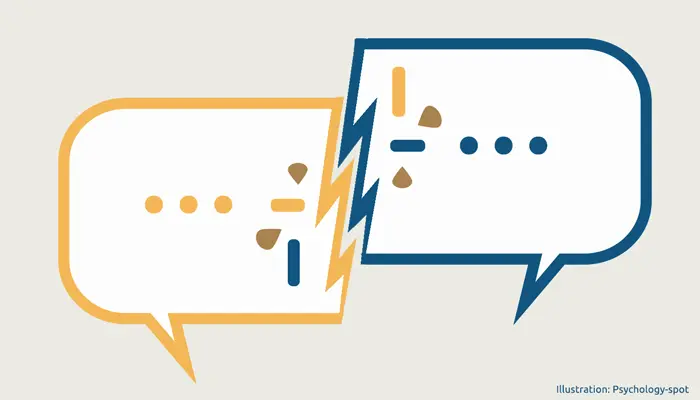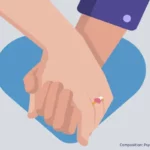
Normally we do not pay much attention to the words we use. We tend to believe that we randomly choose them as required by the circumstances, but it has been proven that everyone has a unique way of speaking, as if it were a “verbal track”.
In fact, a study at VU University in Amsterdam found that extroverted people choose very different words from the introverts. The introverts prefer to speak in more concrete and specific terms and use a more cautious language, full of “perhaps” and “probably”, while extroverted chooses more vague and abstract words in everyday language, but are more direct in expressing their desires.
No doubt, words have a strong impact because they not only serve to describe the world, but also end up creating our own world. In the famous novel by George Orwell “1984”, the writer refers to the tremendous power of language to shape our reality. Indeed, the new idiom that should have been implanted into his dystopian world should have been, “an articulated language emerging from the larynx without involving the brain centers”. In another chapter he says, “Every year there will be less words, so the range of consciousness will be smaller.”
Neuro-Linguistic Programming addresses the importance of words in building our world models. The dialogue we keep with ourselves ends up becoming our truth, so it is important not to abandon it to the social stereotypes or what we have been inculcated in childhood.
The toxic words that sabotage your happiness
1. Guilt. We often say we feel guilty, but we are not fully aware of the repercussions of this word. Feeling guilty implies assuming that something is wrong with us, that some of our characteristics as people are not adequate, which creates a profound existential anguish. Instead, we should use more precise words, such as “I’m sorry for what I did,” which means that our behavior has not been correct, but there is nothing terribly wrong with us.
2. Failure. Henry Ford said that, “failure is a great opportunity to start over with more intelligence”. In fact, failure does not exist, there are only life experiences that lead us in one direction or another. Thinking in terms of failure means taking on the society’s rating meter and adapt to its models of success, so if we do not fit, we assume that we have failed. Therefore, instead of speaking in terms of failure, we should talk in terms of life experiences.
3. Duty. The word duty is one of the strongest bonds that tie us, invented by the society to generate guilt in us when we do not want to do something, when our impulses and desires push us in the opposite direction and we do not see any profit in that act. Many people have ruined their life because they have always used “I must” instead of “I want.” The problem with “duty” is that it makes us run like robots, pushing us to do something we do not want. The solution lies in finding the meaning and getting the “I must” becomes “I want”. We should pay more attention to these verses by Dulce María Loynaz: “Of the dreams I’ve been able to live up to now, of the diamonds offered reluctantly I could not live one day.” This means that you should look for what you are passionate about and let people around you do the same.
4. Impossible. It is not about getting a naive positivism, it is important to be realistic. However, we use the word “impossible” much more than it would be advisable. So much that it often takes the place of the word “improbable”. In our mind, we turn the improbable into impossible, so we preclude a world of opportunities that, though small, can grow with determination. In any case, it is better to think in terms of likelihood instead of taking on lapidary words like ever or impossible. Confucius gives us an idea to face this challenge: “When your goal seems impossible, do not change the goal, look for a new path to get there.”
5. Hate. Hate is one of the most perverse emotions that exist because it ends up causing enormous damage, especially in those who live it. Obviously, hate exists, we cannot eliminate it, but we should make sure we are a lot more specific when we catalog our emotions. It is likely that what we label as hate is actually rancor, frustration or anger, but labeling it as hate will make it grow and become really that emotion that derails our peace.
6. Always. The problem with this word is that it usually comes out of our mouth when we try to rebuke someone: “You always do this” or when we try to defend something: “We always did it this way.” However, “always” is synonymous with immobility, so it is a word that does not fit the reality, simply because things change constantly. This word often hides the resistance to change, the desire to cling to the past and the denial of evolution. Therefore, it is important to use this word with great caution.
7. Never. As the word always, also never is an immovable word that does not faithfully reflect reality, which is constantly evolving. This word is the reflection of a rigid thinking that excludes the opportunities or new paths that can open up to us. Remaining open to change is crucial because it will allow adapting ourselves, thinking that something could never happen can cause us a big disappointment.
8. Problem. The word “problem” has very negative implications because it is associated with obstacles and difficulties. When we include it in our internal dialogue, our brain reacts immediately by activating all the alarms and generating a state of stress and anxiety. We can resize it, assuming it’s actually an opportunity, or we can choose a simpler path and replace it directly with the word “challenge”. All the problems, in the end, are just challenges that imply that we have to change something. We can choose whether to focus on its negative aspect or highlight the possibility of change.
9. Sooner or later. Milton Erickson said that “a goal without a date is just a dream”. If you are one of those people who always say to yourself, “I’ll do it sooner or later,” then it’s likely that you have paused your life projects. These words usually hide the fear of failure, to leave the area of comfort or lack of trust in our abilities. If we really want something, we need to engage and work out an action plan. Otherwise, “sooner or later” will become “never”.
10. Try. Do it or not, but do not try it. Saying we will try to do something often means that we are not quite sure, that we are not sufficiently compromised and/or that we are not quite capable. Anyway, it means starting with the wrong foot. It is true that things do not always go as expected and we cannot always achieve the goals we have set ourselves, but we must start with a positive attitude.
Source:
Beukeboom C. J. (2013) The Language of Extraversion Extraverted People Talk More Abstractly, Introverts Are More Concrete. Journal of Language and Social Psychology; 32(2).



